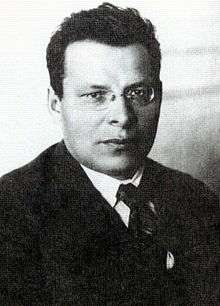Jānis Rudzutaks
| Jānis Rudzutaks Ян Эрнестович Рудзутак | |
|---|---|
 | |
| People's Commissar of the Workers' and Peasants' Inspectorate | |
|
In office 9 October 1931 – 11 February 1934 | |
| Premier | Vyacheslav Molotov |
| Preceded by | Andrey Andreyev |
| Succeeded by | Post abolished |
| People's Commissar for Railways | |
|
In office 2 February 1924 – 11 June 1930 | |
| Premier | Alexey Rykov |
| Preceded by | Felix Dzerzhinsky |
| Succeeded by | Moisei Rukhimovich |
| Full member of the 14th, 15th, 16th, 17th Politburo | |
|
In office 23 July 1926 – 26 May 1937 | |
| Candidate member of the 12th, 13th, 14th Politburo | |
|
In office 26 April 1923 – 23 July 1926 | |
| Full member of the 12th Secretariat | |
|
In office 26 April 1923 – 2 February 1924 | |
| Personal details | |
| Born |
3 August 1887 Kuldīga, Latvia, Russian Empire |
| Died |
29 June 1938 (aged 50) Moscow, Russian SFSR, Soviet Union |
Jānis Rudzutaks (Russian: Ян Эрнестович Рудзутак; August 3, 1887 – July 29, 1938) was a Bolshevik revolutionary and a Soviet politician.
Rudzutaks was born in the Kuldīga district of the Courland Governorate (present-day Kursīši parish, Saldus municipality, Latvia), into the family of a farm worker. In 1903, he started working in a factory in Riga. Two years later, he joined Latvian Social Democratic Labour Party. In 1907, Rudzutaks was arrested because of his political views and was sentenced to 10 years of hard labor. He served a part of his sentence in Riga and was then transferred to Butyrka prison in Moscow. Rudzutaks was released after the February Revolution of 1917.
After his release, Rudzutaks served in various positions in the All-Russia Communist Party, Soviet system and labor unions. He became a close friend and working associate of Vladimir Lenin.[1] From 1920 to 1921, he was the secretary general of All-Russia Central Council of Labor Unions. From 1922 to 1923, Rudzutaks was the chairman of Central Asian bureau of the Central Committee of the All-Russia Communist Party and, from 1923 to 1924, a secretary of the Central Committee. From 1924 until 1934, he was the People's Commissar (i.e., minister) for transportation. In 1926, Rudzutaks was appointed Deputy Chairman of the Council of People's Commissars (the equivalent of Deputy Premier) and held this position until 1937.
Rudzutaks was a member of the Central Committee of All-Russia Communist Party from 1920 until 1937, a candidate member of the Politburo from 1923 to 1926 and from 1934 to 1937 and a full member of the Politburo from 1926 to 1932.
On May 24, 1937, Rudzutaks was arrested. He was accused of Trotskyism and espionage for Nazi Germany, and sentenced to death after a trial, which unlike the well-known Moscow Trials, received very little publicity. He was shot by the NKVD in 1938, and there was a wall of silence surrounding him after this death.[2] In 1956, Rudzutaks's case was re-examined. As a result, he was exonerated and his Communist Party membership was posthumously restored.
The memoirs of another Bolshevik, Anastas Mikoyan, mention that, before the death of Vladimir Lenin in 1924, Lenin proposed Rudzutaks as a replacement for Joseph Stalin as the secretary general of the Communist Party. If true, this would have undoubtedly contributed to Stalin's determination for eliminating Rudzutaks. While Lenin's criticism of Stalin is well known from the Lenin's Testament, Mikoyan's memoirs are the only source mentioning Rudzutaks as the possible replacement for Stalin.
See also
Notes
- ↑ Barmine, Alexander, One Who Survived, New York: G.P. Putnam (1945), p. 12
- ↑ Roy Medvedev, Let History Judge, 1971
References
- Barmine, Alexander, One Who Survived, New York: G.P. Putnam (1945)